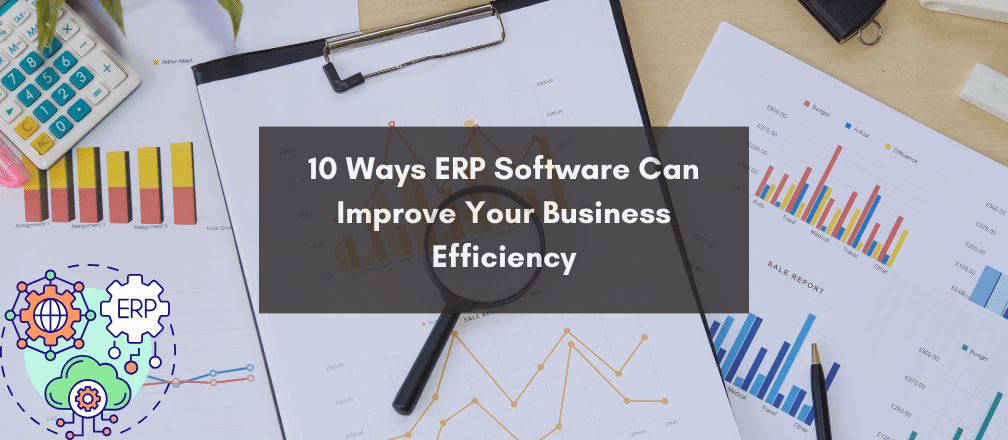10 Ways ERP Software Can Improve Your Business Efficiency

Enterprise resource planning, or ERP software, has become a transformative tool for most businesses. Whether it is a small or large company, ERP systems provide unparalleled management and integration, which is necessary for operational procedures. As most companies have started choosing ERP Solutions, it has significantly boosted operational efficiency and improved productivity and profitability.
Irrespective of the business genre you are from, the software solution can be customized according to your unique business requirements, ensuring that you get the most benefits from it.
The following are some of the ways ERP software enhances business efficiency.
1. Streamline processes:
ERP systems generally excel in integrating several business functions into a unified platform. From procurement supply chain management to sales and customer services, it can be handled and unified with this platform. Such a centralized procedure can facilitate smoother workflow, accelerate decision-making, and reduce the chances of errors. For example, an ERP system can seamlessly automate the procurement process from purchase to payment processing in order to enhance operational efficiency.
2. Centralized data management:
At the core of the ERP system is the unified database, which can consolidate data from several departments. It ensures the maintenance of real-time availability and consistency of information. Therefore, it can seamlessly eradicate data silos and enable departments to seamlessly access updated information, which can help in the decision-making procedure.
3. Improved collaboration and communication:
By breaking barriers between several departments, the ERP system can encourage interconnectedness and partnership in the work environment. Some of the most common features, like real-time updates, integrated communication, and shared databases, are the tools that enable the seamless exchange of information and cooperation to drive innovation and productivity.
4. Better financial management:
Financial oversight can be critical for any business, and an ERP system provides a comprehensive tool for financial analysis and tracking. The system supports a wide range of features like advanced budgeting, financial forecasting, and advanced reporting capabilities to help businesses easily manage finances effectively and make strategic decisions based on real-time data and accuracy.
5. Improve human resource management:
ERP software can seamlessly streamline the HR process by automating several tasks, like payroll, which can benefit administration. It can also help with employee recordkeeping. Such a level of automation can reduce the manual effort of the HR team so that they can focus on creating strategic initiatives, like employee engagement, talent, development, and workforce planning, to increase overall efficiency.
6. Improved customer service:
Integrated CRM functionalities within the ERP system can provide a 360° view of customer interactions. Therefore, it can help businesses easily deliver efficient and personalized services. Such a holistic approach can help businesses understand their customers properly, increasing customer loyalty, satisfaction, and better response.
7. Supply chain optimization:
ERP systems have been designed with a range of features and functionalities. It includes robust tools that can easily optimize and manage the supply chain. It can manage inventory control, order tracking, procurement planning, and supplier management. As it provides real-time visibility into different aspects of the supply chain, ERP systems can become beneficial for businesses to reduce lead times, minimize costs, and make effective responses according to market demands.
8. Inventory management:
Proper inventory management is important to achieve operational efficiency. An ERP system can facilitate precise management and tracking of inventory levels to make sure that you are able to manage your inventory and maintain customer satisfaction. It makes sure that the optimum stock levels are maintained. This reduces the chances of excess inventory or stock out and ensures improved order fulfillment rate and satisfaction.
9. Risk management:
ERP systems ensure compliance with industrial standards and regulations by standardizing business processes and maintaining overall records. They also provide risk management tools that can greatly benefit assessing, identifying, and eliminating potential risks. Therefore, they ensure protection against challenges and business continuity.
10. Flexibility and scalability:
As business evolves, there is a need for change. These ERP systems are new-age software that has been designed with the need for flexibility and scalability kept in mind. It can adapt to the latest business requirements and accommodate growth. Whether it is about expanding into a new market, reorganizing business units, or adding product lines, ERP systems can easily meet the dynamic requirements of a growing business.
Implementing an ERP system is a game changer for today’s businesses that are looking forward to increasing competitiveness and efficiency. By providing a centralized data management system, enhanced collaboration, and streamlined processes, this ERP system can optimize operations, achieve sustainable growth, and make data-driven decisions in today’s business landscape. If you’re willing to implement the latest ERP solution, Cogniscient can be a valuable choice. The wide range of expertise and talent in the team ensures customizability and seamless integration across the business process.

